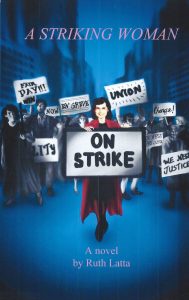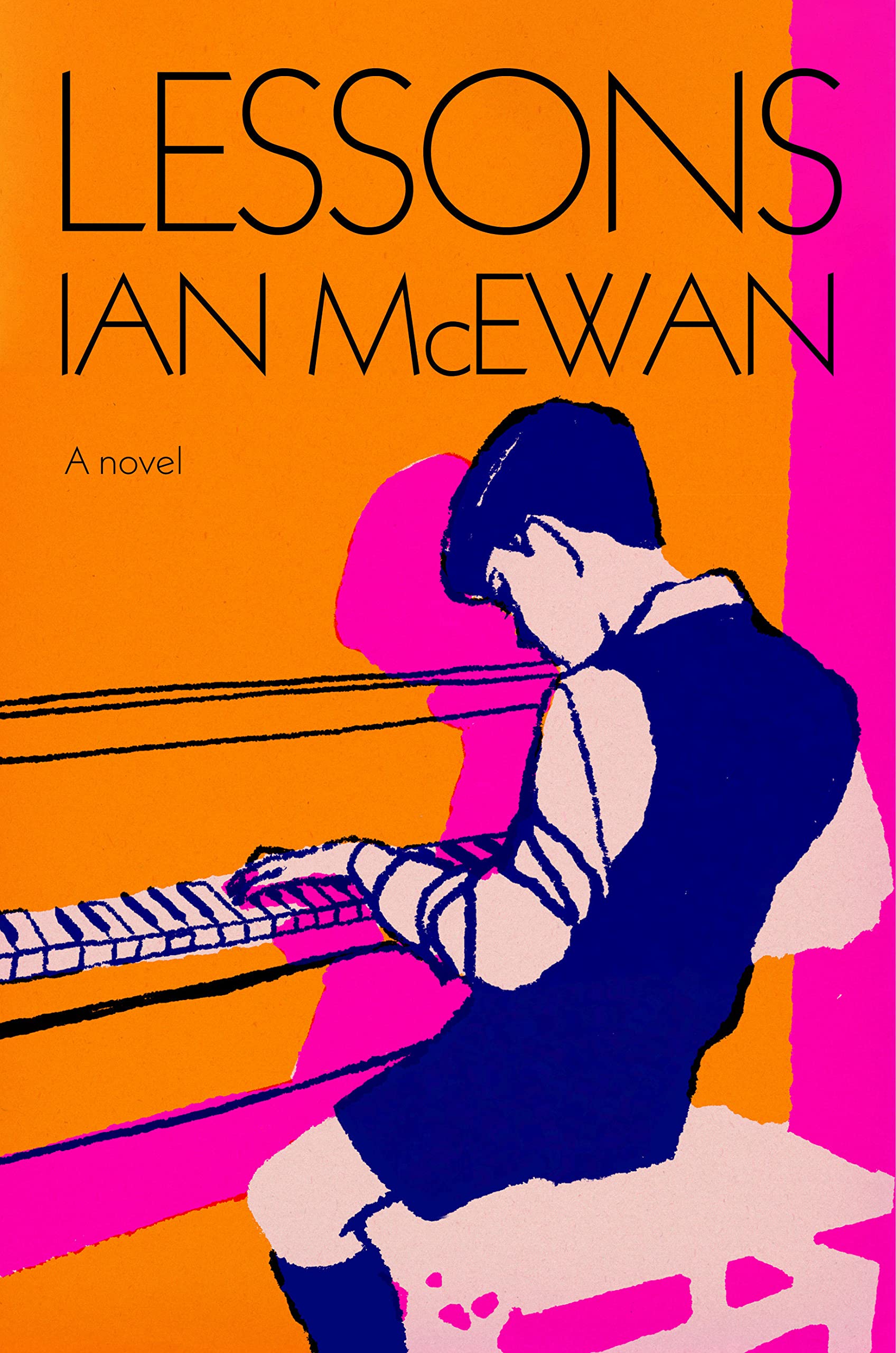 It is not just the style and formatting that is soaked with the understanding of time, but the prose itself which is permeated with the musings and misgivings about the passing of time, and the understanding of times influence on the world that surrounds. The first section of the book is half of the text, and through it the reader comes to understand that Lanny, like Dead Papa Toothwort, is so in tune with the earth that he doesn’t follow the rationality of humans, of the mundane.
It is not just the style and formatting that is soaked with the understanding of time, but the prose itself which is permeated with the musings and misgivings about the passing of time, and the understanding of times influence on the world that surrounds. The first section of the book is half of the text, and through it the reader comes to understand that Lanny, like Dead Papa Toothwort, is so in tune with the earth that he doesn’t follow the rationality of humans, of the mundane.
A review of A Striking Woman by Ruth Latta
 A Striking Woman is a powerful look at a challenging era in world history. The author expertly and accurately paints a true picture of society in early twentieth-century Quebec, setting the stage for the confrontations that developed later in the life of one very determined woman. Her knowledge of contemporary history is evident. The title is catchy and certainly provides the reader with multiple metaphoric connections to the word, ‘striking’. Ruth has a vivid approach to portraying Canadian women throughout history.
A Striking Woman is a powerful look at a challenging era in world history. The author expertly and accurately paints a true picture of society in early twentieth-century Quebec, setting the stage for the confrontations that developed later in the life of one very determined woman. Her knowledge of contemporary history is evident. The title is catchy and certainly provides the reader with multiple metaphoric connections to the word, ‘striking’. Ruth has a vivid approach to portraying Canadian women throughout history.
A review of The Taiga Syndrome by Cristina Rivera Garza
 Throughout the text Garza challenges the readers memory of what came before in the text using the window, but also through the pervasive repeated “I remember(s)” that occur throughout the text. Each time a thing is remembered it is changed, slightly altered. Which begs the question, how is what we have read previously in the text altered through both the frame of our own remembrance of it and the continual recollections of the narrator?
Throughout the text Garza challenges the readers memory of what came before in the text using the window, but also through the pervasive repeated “I remember(s)” that occur throughout the text. Each time a thing is remembered it is changed, slightly altered. Which begs the question, how is what we have read previously in the text altered through both the frame of our own remembrance of it and the continual recollections of the narrator?
A review of The Beckoning World by Douglas Bauer
 Lou Gehrig, as wrought by Bauer’s pen, appears as he was in life — a pensive, quiet soul, dogged by insecurities and excessively devoted to his mother. Ruth, in the pages of The Beckoning World, is supremely confident, self-absorbed, voluptuary — a boy raised in an orphanage to be deified by a nation. As the Yankee sluggers barnstorm their way through the small-town west, Earl will experience an encounter that provides shape to his own life’s story.
Lou Gehrig, as wrought by Bauer’s pen, appears as he was in life — a pensive, quiet soul, dogged by insecurities and excessively devoted to his mother. Ruth, in the pages of The Beckoning World, is supremely confident, self-absorbed, voluptuary — a boy raised in an orphanage to be deified by a nation. As the Yankee sluggers barnstorm their way through the small-town west, Earl will experience an encounter that provides shape to his own life’s story.
A review of Lessons by Ian McEwan
 The story begins in medias res, with Roland Baines, in his home in Clapham, waking from a nightmare about his boyhood piano lessons, and realizing that he is now a grown man taking care of his infant son, Lawrence. Roland is “the baby’s bed and his god.” Alissa, Roland’s wife, has vanished, leaving a note telling him not to find her. “I have been living the wrong life. Please try to forgive me,” she wrote.
The story begins in medias res, with Roland Baines, in his home in Clapham, waking from a nightmare about his boyhood piano lessons, and realizing that he is now a grown man taking care of his infant son, Lawrence. Roland is “the baby’s bed and his god.” Alissa, Roland’s wife, has vanished, leaving a note telling him not to find her. “I have been living the wrong life. Please try to forgive me,” she wrote.
An interview with Black Foam’s Haji Jaber
 The author of Black Foam talks about his new book, why he wrote it, his research, the relationship between his work as a journalist and his work as a writer, his audience, his favourite books, Dar al-Tanweer, why he teaches, and more.
The author of Black Foam talks about his new book, why he wrote it, his research, the relationship between his work as a journalist and his work as a writer, his audience, his favourite books, Dar al-Tanweer, why he teaches, and more.
A review of Admissions: Voices within Mental Health edited by David Stavanger, Radhiah Chowdhury, Mohammad Award
 Like the best anthologies, Admissions is a fluid collection where the different genres, explorations and styles of creativity inform one another, creating a montage that is inherently collective. This ‘radical empathy’ that Stavinger talks about is present throughout the book, as the different forms of pain and struggle sit together in solidarity like a supportive scaffold so that in the reading the separation between the different experiences becomes diminished and there is a sense that every perspective fits and is important.
Like the best anthologies, Admissions is a fluid collection where the different genres, explorations and styles of creativity inform one another, creating a montage that is inherently collective. This ‘radical empathy’ that Stavinger talks about is present throughout the book, as the different forms of pain and struggle sit together in solidarity like a supportive scaffold so that in the reading the separation between the different experiences becomes diminished and there is a sense that every perspective fits and is important.
A review of The Return by Aaron Paul Lazar
 The book is fast paced, drawing you in from the first chapter, and progressing with exciting turns in a way that the book is always pleasurable and satisfying, and even the worst antagonists are treated with empathy. It’s hard not to like Gus, who is always ready to lend a helping hand or a basket of fresh picked zucchinis and corn. Lazar is a master craftsman and pays careful attention to language, plot, pacing and character so that all of the elements tie together neatly and seamlessly, description charged with rich nostalgia
The book is fast paced, drawing you in from the first chapter, and progressing with exciting turns in a way that the book is always pleasurable and satisfying, and even the worst antagonists are treated with empathy. It’s hard not to like Gus, who is always ready to lend a helping hand or a basket of fresh picked zucchinis and corn. Lazar is a master craftsman and pays careful attention to language, plot, pacing and character so that all of the elements tie together neatly and seamlessly, description charged with rich nostalgia
States that Matter, a review of The Best of Tupelo Quarterly edited by Kristina Marie Darling
 As a poet, my ultimate aim is to connect to my reader, so that I may get close to causing a moment of understanding, a resonance, a tapping-into of the unsayable. As a human, I feel nourished when art is not only allowed to break the mould, but it is celebrated for doing so. The rules of the universe only help us understand a fraction of what is happening to us.
As a poet, my ultimate aim is to connect to my reader, so that I may get close to causing a moment of understanding, a resonance, a tapping-into of the unsayable. As a human, I feel nourished when art is not only allowed to break the mould, but it is celebrated for doing so. The rules of the universe only help us understand a fraction of what is happening to us.
A review of Passages by Jenni Nixon
![]() These are certainly not poems overflowing with sentimentality. Nixon has total control of her words, and is measured and diligent in creating and intelligent and elegant narrative in poetry form, whether she writes about helping a neighbour, the compulsory acquisition of hundreds of homes for the construction of tunnels or other environmental concerns.
These are certainly not poems overflowing with sentimentality. Nixon has total control of her words, and is measured and diligent in creating and intelligent and elegant narrative in poetry form, whether she writes about helping a neighbour, the compulsory acquisition of hundreds of homes for the construction of tunnels or other environmental concerns.